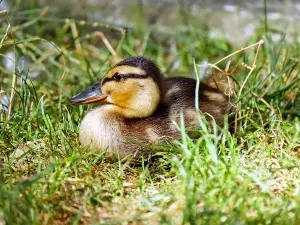
Hatching is very tiring for ducklings, this process can make any bird weak but this weakness should not persist for too long.
If your duckling is constantly weak then there is likely something wrong with it, this article explores this topic
Table of Contents
Weak duckling:
Ducklings should regain their strength a little while after they hatch and should maintain this strength for a while. If your duckling is weak reasons for this include:
Prematurity:
If one of your ducklings hatched prematurely, then it will automatically be weaker than ducklings who were not born prematurely. Premature birds may be so weak that they aren’t able to move.
What to do:
If your premature bird has just hatched then the first thing you can do to help it is to create a brooder for the bird to keep it isolated and warm.
Create a makeshift brooder for the bird out of a cardboard box or another container. Add pine shavings to the bottom of the brooder to absorb the bird’s poop and pee, and replace these shavings regularly.
Keep the duckling warm by adding a heat lamp to the brooder. You can use a red lamp for the bird’s brooder, this will ensure that the bird’s sleep isn’t disturbed.
Clean the bird as soon as it hatches and then leave it in the brooder.
You can also choose to clean the bird up, wrap it in a thin towel and then keep the bird close to your chest to share your body heat.
The premature bird will likely have not had enough time to absorb the yolk while in the shell, this may be why the bird is weak. Give sugar water to your bird to perk it up.
If your baby duck cannot drink on its own then you can offer the bird the sugar water using a syringe or a dropper.
If the bird has taken the water, and is keeping it down, then you can give it more nutritious food. Grind up some starter feed, add room temperature water to it and feed this to the bird.
Let the bird sleep in the brooder at night and gently place a tea towel over it to mimic how a duckling in the wild would sleep under its mother’s wings.
If the bird’s feathers fluff up and the bird starts making noises then it will be ok, this may take 5 – 7 days.
Feeding issues:
What you feed your bird has a big impact on how your bird behaves. The incorrect diet will cause your bird to be weak. Feeding your duck a medicated chick starter feed is not recommended, this feed is good for chicks but not good for ducklings.
What to do:
Feed waterfowl starter crumbs or unmedicated chick crumbs to your bird 24 hours after it hatches.
The bird won’t need to be fed anything during the first 24 hours of its hatching because it will survive off of the yolk that it absorbed while in the egg, it only needs to eat 24 hours after hatching.
You can buy this feed from agricultural supply stores. The bird can have this for the first 10 days of life. After the 10 days are up, feed the bird grower pellets and then move on to maintenance pellets after 16 weeks of life.
Giving your bird vitamins like Polyvisol is also recommended.
If your bird is particularly weak then you may want to consider giving the bird a mashed-up hard-boiled egg to help it regain its strength. You can also try to give the bird a small amount of sugar water to give it a boost of energy
Heat stress:
Many animals in the animal kingdom can suffer from heat stress, ducklings included. Heat stress may be the reason why your bird is weak.
If your bird is exposed to long periods of extreme heat then heat stress can set in.
Signs of a bird suffering from heat stress, in addition to the bird being weak, include droopy wings, sitting with their eyes closed, laying on their side, panting, holding their wings out to the sides of their body, and standing or sitting with their eyes closed.
What to do:
If your bird is suffering from heat stress then you’d need to take steps to cool the bird down.
Start off by offering the bird cold, clean, water to drink. Leave more waterers out for your birds and leave these waterers in shaded areas. You may also want to keep the water cool by adding ice cubes to it.
Give the bird a large swimming pool where it can cool off in. You can use a horse trough, a plastic kiddie pool, or any other large container for this. Replace the water in the pool daily.
Make sure that the pool isn’t too deep, keep the water level to where the bird can stand on its own.
Give your bird water-dense, and cooled treats like watermelon, sliced strawberries, sliced cucumbers, lettuce, blueberries, and peas.
You can also leave the birds in the shade to keep the birds from overheating.
If you enjoyed this article then you may also be interested in other duck related articles. Here are some articles that you may be interested in: Duck Eggs Not Pipping, Newly Hatched Duckling Problems, Lethargic Duckling, Duckling Hatched With Unabsorbed Yolk

